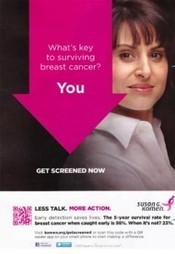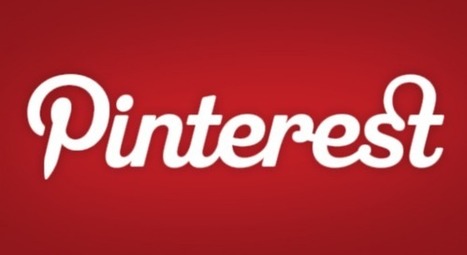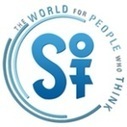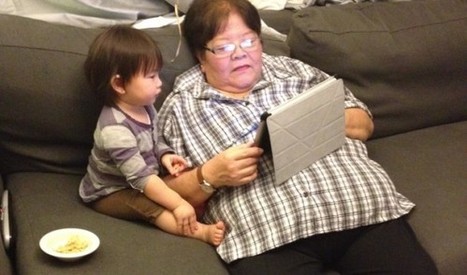 Your new post is loading...
 Your new post is loading...

|
Scooped by
Dr Veronica Anderson
August 11, 2012 11:16 AM
|
Now you can check-in to a location on Facebook through facial recognition scanning.

|
Scooped by
Dr Veronica Anderson
August 10, 2012 4:45 PM
|
Employers expect health insurance costs to rise 7 percent next year so they are looking to beef up their cost-control measures, including boosting wellness programs and enhancing employees' cost-sharing measures.

|
Scooped by
Dr Veronica Anderson
August 10, 2012 1:47 PM
|

|
Scooped by
Dr Veronica Anderson
August 10, 2012 12:42 PM
|
The CDC is launching a pre-emptive strike” aimed at delaying the emergence of complete drug resistance in gonorrhea.

|
Scooped by
Dr Veronica Anderson
August 10, 2012 12:38 PM
|
The slowdown in the growth in health spending predated the recession by nearly two-and-a-half years, one analysis shows, giving credence to the notion that the dip can't be pinned solely on the econom...

|
Rescooped by
Dr Veronica Anderson
from healthcare technology
August 10, 2012 11:27 AM
|
Direct communication between the pharmaceutical industry and patients is increasingly common. An important milestone in direct-to-consumer advertising (DTCA) was the 1995 FDA hearings, at which pharmaceutical companies requested that the FDA clarify the conditions under which broadcast advertisements need not include a brief summary of benefits and risks from the approved product label. The FDA subsequently stated that these advertisements could instead send consumers to a website, toll-free telephone number, print advertisements, or health professionals for this information. Overall pharmaceutical spending on DTCA then shifted from predominantly print to broadcast advertisements and rose from $1.3 billion in 1998 to $4.9 billion in 2007. While the pharmaceutical industry has consistently argued that DTCA empowers patients by providing information on potentially undiagnosed health conditions and enabling them to initiate conversations with their physicians about treatments, physicians and physician groups have expressed concerns that DTCA would lead patients to request, and doctors to fulfill, inappropriate prescriptions. Limited evidence on the effect of DTCA on prescribing practices, including a single randomized controlled trial of DTCA for antidepressants suggests that DTCA increases prescribing of advertised medications in general, both for appropriate and inappropriate indications.
Via nrip

|
Rescooped by
Dr Veronica Anderson
from healthcare technology
August 10, 2012 11:23 AM
|
Doctors and other healthcare professionals must prepare for the rise of ‘ePatients’ in the coming years and keep apace with the evolving digital landscape. This is according to the 2012 version of ‘Learning to manage Health Information’, a clinical education guide that has been running since 1999. Its aim is to understand the digital world and healthcare professionals’ working requirements within it. This year’s focus is on the rise of the ePatients, who come to surgeries armed with information found on the internet about their condition - and are often more digitally aware than their doctor. The guide says that in the near future, clinicians will be dealing more and more with the ePatient, adding that: “today, such patients need not be mere recipients of care and can become key decision-makers in their treatment process.”
Via nrip

|
Scooped by
Dr Veronica Anderson
August 9, 2012 10:30 PM
|
Dr. Anthony Youn, a plastic surgeon practicing in Detroit places most of the blame for long office waiting times at the feet of the patients themselves. He...

|
Scooped by
Dr Veronica Anderson
August 9, 2012 10:25 PM
|
Parents already know the fear that sets in when you think your child has an ear infection.

|
Scooped by
Dr Veronica Anderson
August 9, 2012 10:11 PM
|

|
Scooped by
Dr Veronica Anderson
August 9, 2012 9:54 PM
|
Insults, threats, and even physical abuse are a part of life for many medical students, but a campaign led by one medical school aims to change the culture of mistreatment nationwide.

|
Scooped by
Dr Veronica Anderson
August 9, 2012 7:19 PM
|
Having close relationships with friends and family as a child makes people happier in later life, a new study has found. I bet we would all say that we know this. Then should we spend more time just BEING with our families rather than all the DOING with the lessons and the sport and the such and such? We all seem to believe that having our kids attend Oxford isi going to lead to happiness. When did this attitude become so strong?

|
Scooped by
Dr Veronica Anderson
August 9, 2012 4:19 PM
|
There is only one way to begin chipping away at the exorbitant cost of health care in America. That is by each and every individual adopting a new and different mindset to control spending.
|

|
Scooped by
Dr Veronica Anderson
August 10, 2012 4:47 PM
|
Read about the new feature on Google Translate for Android. Now you can translate pictures.

|
Scooped by
Dr Veronica Anderson
August 10, 2012 3:56 PM
|
Insightful question by a soon-to-be doctor.

|
Scooped by
Dr Veronica Anderson
August 10, 2012 12:56 PM
|
Healthcare reform drives interest in captive insurers | Modern Healthcare...

|
Scooped by
Dr Veronica Anderson
August 10, 2012 12:39 PM
|
WASHINGTON -- The FDA needs to provide more specifics on what nanotechnology products it is regulating and in what ways, members of an agency advisory committee said Thursday.

|
Scooped by
Dr Veronica Anderson
August 10, 2012 11:57 AM
|
Which of the following is the strongest predictor of an individual's health status? A) Age B) Income C) Literacy skills D) Education level E) Racial or ethnic group [AS: The clue is in the title... ;) ]

|
Scooped by
Dr Veronica Anderson
August 10, 2012 11:24 AM
|
Eve Harris writes: 'Researchers should stop designing inquiries around outcomes that don’t matter to patients. We reviewed some studies that seemed better suited for mice but were nonetheless conducted in humans. Overall, though, it appears that patient perspectives and values are increasingly part of research design. The Patient Centered Outcomes Research Institute (PCORI) is funding exciting new studies. In a recent article, PCORI explains “Why Methods Matter.” The healthcare delivery systems of today differ markedly from those of the past, and the way care is delivered can have a profound impact on outcomes. These factors combine to make it difficult, but critical, for patients and their care providers to understand and use the research information most relevant to the health decisions they make. Providers and patients are making progress in defining and trying out new ways of communicating about clinical decisions. Achieving the best outcomes via this newer, more participatory practice of medicine requires attention not only to the evidence provided by high quality studies but also clinical judgment and respect for the bottom line: patient values.'

|
Rescooped by
Dr Veronica Anderson
from healthcare technology
August 10, 2012 9:46 AM
|
Engineers have to realize that the current decision makers (senior surgeons) on the clinical side of R&D were trained to do things a certain way, that they do very well and have been shown to have very good outcomes. Senior surgeons often want to know that new technologies can operate in the same workflow they are comfortable with and that there is always a failure mode that allows them to use their existing well-honed skill-set to fix any problems. Residents and junior surgeons will often be more comfortable with newer technologies, but they often won’t adopt them without support from the senior partners in a group or senior faculty in an academic medical practice. It follows that engineers will have to design and convince two sets of end users: the senior and junior surgeons, both groups of whom are concerned with how new technologies will fail them, but with two different mindsets. In the other direction, surgeons should realize that when they go looking for an academic engineer to solve a problem, that engineers don’t think in terms of differentials and that they are not going to automatically accept that the surgeons’ way of doing things is optimal. Often, the best way to pose a problem to an engineer is to follow this rough guide:
Via nrip

|
Scooped by
Dr Veronica Anderson
August 9, 2012 10:28 PM
|
Read about a chance in the way you register for Pintrest. The site now allows open registration instead of e-mail invites.

|
Rescooped by
Dr Veronica Anderson
from healthcare technology
August 9, 2012 10:24 PM
|
Traditionally, a physician’s reputation was best established and passed along by word of mouth. Discussions among friends or at church, sporting events or civic groups often provided the information necessary for potential patients to choose a healthcare provider. Today, most patients and consumers of healthcare get information about medical conditions and physicians online. Some studies have shown that nearly 80% of today’s consumers go online first when evaluating a medical provider. Information (whether accurate or not) is consumed and perpetuated at a light-speed pace and it is often difficult to keep up with your own digital presence. Physicians must actively manage their online reputations or suffer the consequences of an unfair and unfounded digital reputation. In my world, online reputation is critical. Cyberspace is where my patients and customers are, where they go first and where I need to be.
Via nrip

|
Scooped by
Dr Veronica Anderson
August 9, 2012 10:09 PM
|
The sick will always be among us. If you want a permanent job.....healthcare which remains sickcare under Obamacare. Given there is not shift to wellness on the horizon, American should retrain workers for tasks needed in healthcare.

|
Scooped by
Dr Veronica Anderson
August 9, 2012 7:26 PM
|
At its most fundamental level, diabetes is a disease characterized by stress -- microscopic stress that causes inflammation and the loss of insulin production in the pancreas, and system-wide stress due to the loss of that blood-sugar-regulating...

|
Scooped by
Dr Veronica Anderson
August 9, 2012 4:42 PM
|
Read five healthcare innovations that the elder set will really enjoy in their sunset years from places such as the Carnegie Mellon Quality of Life Technology Center. As we are developing more and more technology to help people manage their chronic diseases, get well and stay well, its still interesting that the population is not getting well. What factor are innovators and healthcare providers missing?
|

 Your new post is loading...
Your new post is loading...
 Your new post is loading...
Your new post is loading...







![The Future of Healthcare is Already at Your Fingertips [INFOGRAPHIC] | Doctor Data | Scoop.it](https://img.scoop.it/lxqpXLztYaFTw5xXUVE6gjl72eJkfbmt4t8yenImKBVvK0kTmF0xjctABnaLJIm9)



















